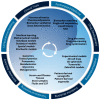Clinical Network Systems Biology: Traversing the Cancer Multiverse
- PMID: 37445570
- PMCID: PMC10342467
- DOI: 10.3390/jcm12134535
Clinical Network Systems Biology: Traversing the Cancer Multiverse
Abstract
In recent decades, cancer biology and medicine have ushered in a new age of precision medicine through high-throughput approaches that led to the development of novel targeted therapies and immunotherapies for different cancers. The availability of multifaceted high-throughput omics data has revealed that cancer, beyond its genomic heterogeneity, is a complex system of microenvironments, sub-clonal tumor populations, and a variety of other cell types that impinge on the genetic and non-genetic mechanisms underlying the disease. Thus, a systems approach to cancer biology has become instrumental in identifying the key components of tumor initiation, progression, and the eventual emergence of drug resistance. Through the union of clinical medicine and basic sciences, there has been a revolution in the development and approval of cancer therapeutic drug options including tyrosine kinase inhibitors, antibody-drug conjugates, and immunotherapy. This 'Team Medicine' approach within the cancer systems biology framework can be further improved upon through the development of high-throughput clinical trial models that utilize machine learning models, rapid sample processing to grow patient tumor cell cultures, test multiple therapeutic options and assign appropriate therapy to individual patients quickly and efficiently. The integration of systems biology into the clinical network would allow for rapid advances in personalized medicine that are often hindered by a lack of drug development and drug testing.
Keywords: cancer systems biology; clinical network systems biology; precision medicine; team medicine.
Conflict of interest statement
The authors declare no conflict of interest.
Figures



Similar articles
-
Short-Term Memory Impairment.2024 Jun 8. In: StatPearls [Internet]. Treasure Island (FL): StatPearls Publishing; 2025 Jan–. 2024 Jun 8. In: StatPearls [Internet]. Treasure Island (FL): StatPearls Publishing; 2025 Jan–. PMID: 31424720 Free Books & Documents.
-
Management of urinary stones by experts in stone disease (ESD 2025).Arch Ital Urol Androl. 2025 Jun 30;97(2):14085. doi: 10.4081/aiua.2025.14085. Epub 2025 Jun 30. Arch Ital Urol Androl. 2025. PMID: 40583613 Review.
-
A rapid and systematic review of the clinical effectiveness and cost-effectiveness of paclitaxel, docetaxel, gemcitabine and vinorelbine in non-small-cell lung cancer.Health Technol Assess. 2001;5(32):1-195. doi: 10.3310/hta5320. Health Technol Assess. 2001. PMID: 12065068
-
The Black Book of Psychotropic Dosing and Monitoring.Psychopharmacol Bull. 2024 Jul 8;54(3):8-59. Psychopharmacol Bull. 2024. PMID: 38993656 Free PMC article. Review.
-
NIH Consensus Statement on Management of Hepatitis C: 2002.NIH Consens State Sci Statements. 2002 Jun 10-12;19(3):1-46. NIH Consens State Sci Statements. 2002. PMID: 14768714
Cited by
-
Narrative Review of Patient Cancer Tissue-Derived Zebrafish Xenograft Models for Evaluating Drug Sensitivity as an Avatar Model for Clinical Application.Cancer Med. 2025 Jul;14(13):e70942. doi: 10.1002/cam4.70942. Cancer Med. 2025. PMID: 40567026 Free PMC article. Review.
-
Enhancing Molecular Network-Based Cancer Driver Gene Prediction Using Machine Learning Approaches: Current Challenges and Opportunities.J Cell Mol Med. 2025 Jan;29(1):e70351. doi: 10.1111/jcmm.70351. J Cell Mol Med. 2025. PMID: 39804102 Free PMC article. Review.
-
Network analysis to identify driver genes and combination drugs in brain cancer.Sci Rep. 2024 Aug 12;14(1):18666. doi: 10.1038/s41598-024-69705-9. Sci Rep. 2024. PMID: 39134610 Free PMC article.
-
On the Virtues of "Team Medicine"-A City of Hope Perspective.J Clin Med. 2023 Jul 26;12(15):4897. doi: 10.3390/jcm12154897. J Clin Med. 2023. PMID: 37568299 Free PMC article.
References
-
- Hoadley K.A., Yau C., Hinoue T., Wolf D.M., Lazar A.J., Drill E., Shen R., Taylor A.M., Cherniack A.D., Thorsson V., et al. Cell-of-Origin Patterns Dominate the Molecular Classification of 10,000 Tumors from 33 Types of Cancer. Cell. 2018;173:291–304 e296. doi: 10.1016/j.cell.2018.03.022. - DOI - PMC - PubMed
Publication types
Grants and funding
LinkOut - more resources
Full Text Sources

